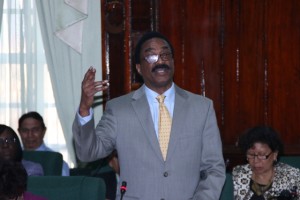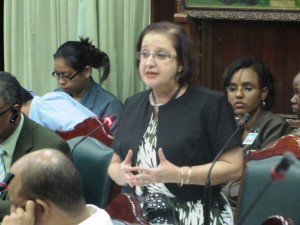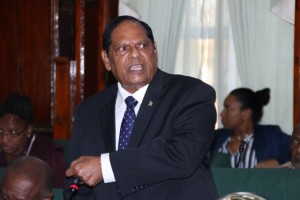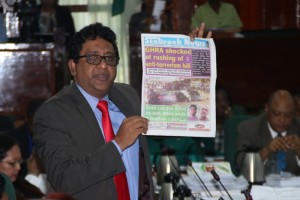Nagamootoo go head to head over Anti-Terrorism Bill
Williams, Nandlall, Teixeira & Nagamootoo go head to head over Anti-Terrorism Bill
By Jomo Paul
[www.inewsguyana.com] – Attorney General, Basil Williams says that despite wide reports in the media, there were consultations on the Anti-terrorism Bill that was read for a first time in the National Assembly on December 17.
The Private Sector Commission (PSC) and the Guyana Human Rights Association (GHRA) made scathing criticisms against government, alleging that the APNU+AFC administration failed to consult on the new legislation.
Before Williams rose to make his statement, Opposition Chief Whip Gail Teixeira had blasted the government for “bulldozing” democracy.
“This is a travesty, the government cannot state what is the emergency with passing these Bills,” said the Chief Whip later adding, “We expect the government will do as they like to do – you got the majority so bulldoze it through.”
She stated that the Government has not been able to provide any reason for wanting the Bills to go through Parliament in one sitting.
“He can spin; he’s a spin doctor. I was expecting some spinning but he ain’t even spin; he just read the motion and sit down…It is a parliamentary travesty…we object sir, we object most strenuously,” she stated, referring to Prime Minister Moses Nagamootoo.
She then called on the Prime Minister to “do the honorable thing as the leader of this house and withdraw the motion.”
However, AG Williams later rose on the floor and stated that several bodies in Guyana were consulted on the Bill. Those bodies include but are not limited to the Commissioner of Police, the Guyana Revenue Authority, PSC, the Central Islamic Association of Guyana (CIOG) and the Guyana Bar Association.
The Attorney General stated that those Associations were emailed with a copy of the Bill and asked to offer comments since July 5, 2015.
“Everything is brand new to them where democracy is concerned – this is not no old Bill or unfamiliar Bill – this is a PPP Bill…It has 58 clauses and only two clauses are relevant to the process so all the other clauses were introduced by the Honorable Member Mr Rohee; that is why it is the Rohee Bill,” said Williams.
He also explained the government’s rush to pass the Bills through Parliament, noting that Guyana has to comply with certain regulations in the Americas Regional Review Group of the international financial regime monitoring body.
“So Mr Speaker, this Bill has to pass before the end of the year,” said Williams adding “We have sufficient justification to do the people’s business and not cause any mayhem in Guyana.”
He said the Government would not allow the Opposition to stymie Government’s approaches to regulate Guyana under the international financial regime.
“All it was, was a great hoax,” he said referring to claims of non-consultation.
Former Attorney General Anil Nandlall later retorted that “sending off some emails to selected organizations,” does not amount to consultations.
“Today they are telling the GHRA and they are telling the private sector that they are not entitled to two seconds of consultations…this approach is totally inconsistent with what they advocated for in the Opposition, it is against the constitution, it is undemocratic, it is authoritarian,” said Nandlall.
Meanwhile, Nagamootoo later rose stating that it was government’s business to protect the State and doing so meant passing these Bills into law.
He said that statements that the there were no consultations on the Bill are not “only misleading statement, it flies in the face of truth.”
He argued that it is totally irresponsible to come into this August Assembly and make baseless allegations.
“The question of bulldozing has no merit whatsoever. They want to use the Parliament to frustrate the people’s business – the government’s business,” said the Prime Minister.






